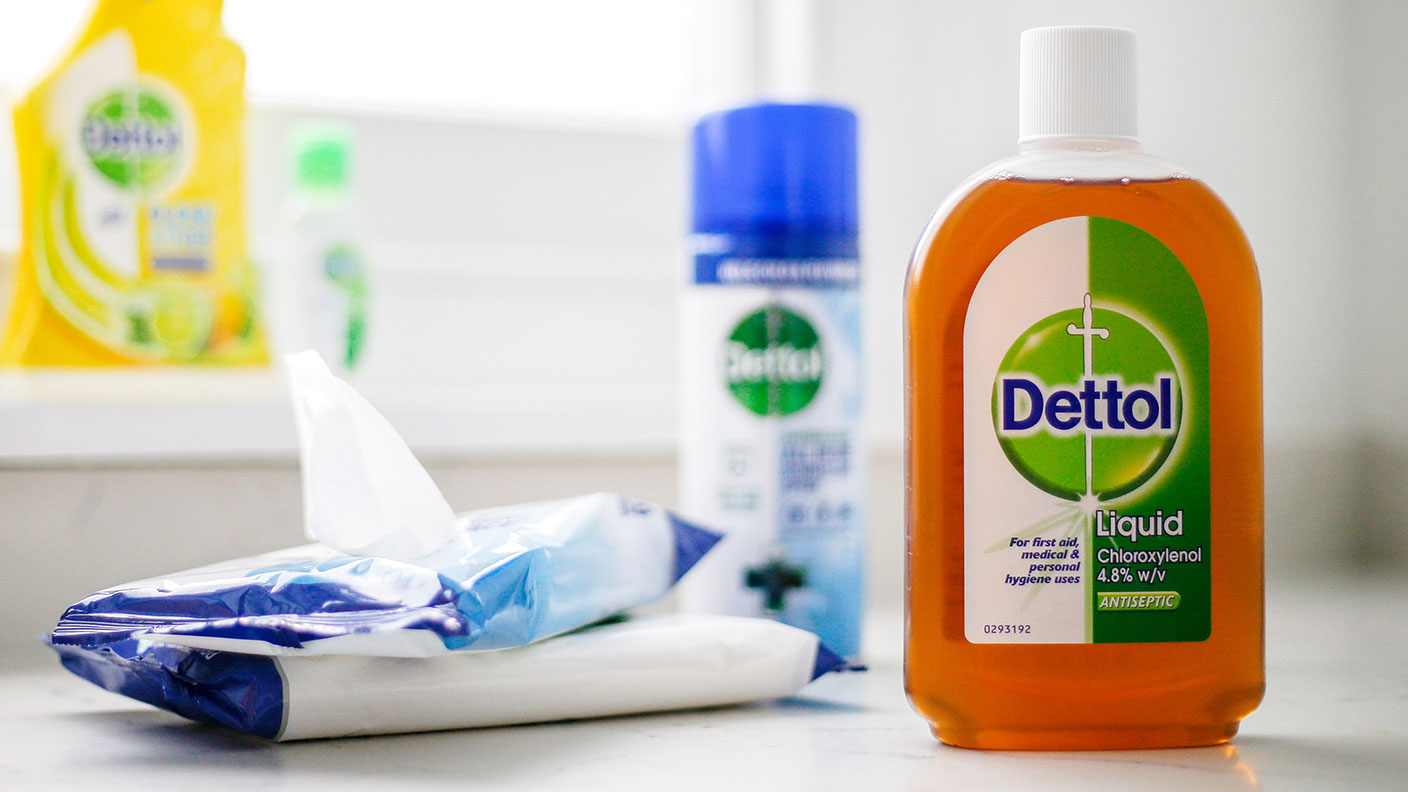Reckitt Benckiser’s clean-up
The consumer-goods sector is no longer the cash cow it once was. Reckitt’s revamp will help it buy some growth. Alice Gråhns reports.
Get the latest financial news, insights and expert analysis from our award-winning MoneyWeek team, to help you understand what really matters when it comes to your finances.
You are now subscribed
Your newsletter sign-up was successful
Want to add more newsletters?

Twice daily
MoneyWeek
Get the latest financial news, insights and expert analysis from our award-winning MoneyWeek team, to help you understand what really matters when it comes to your finances.

Four times a week
Look After My Bills
Sign up to our free money-saving newsletter, filled with the latest news and expert advice to help you find the best tips and deals for managing your bills. Start saving today!

The consumer-goods sector is no longer the cash cow it once was. Reckitt's revamp will help it buy some growth. Alice Grhns reports.
Growth at a reasonable price is the holy grail for investors. In the consumer-goods sector, however, they have been "buying no growth at an unreasonable price", as Jonathan Eley notes in the Financial Times. Valuations are high, but sales growth at Unilever and Nestl is "sluggish"; at Reckitt Benckiser, it is falling.
The CEO of the Dettol-to-Durex empire, Rakesh Kapoor, has now finally admitted there's a growth problem, says Chris Hughes on Bloomberg. Third-quarter sales fell 1% to £3.2bn on a like-for-like basis, with the growth guidance for this year cut from 2% to zero.
MoneyWeek
Subscribe to MoneyWeek today and get your first six magazine issues absolutely FREE

Sign up to Money Morning
Don't miss the latest investment and personal finances news, market analysis, plus money-saving tips with our free twice-daily newsletter
Don't miss the latest investment and personal finances news, market analysis, plus money-saving tips with our free twice-daily newsletter
One-offs such as last June's Petya cyberattack aside, previously fast-growing Reckitt is no longer outpacing its markets. "The central issue seems to be that Reckitt has just got too big to run." Eight months after its $18bn acquisition of US infant-nutrition company Mead Johnson, Reckitt's "DNA" has become "stretched", say managers.
Kapoor's response is a revamp that will split the group into two. He's taking control of the new health unit, which accounts for 60% of sales and brands including Nurofen and Strepsils, while Europe and US boss Rob de Groot will run the hygiene and home business, with labels such as Cillit Bang and Vanish.
But Reckitt will need "more than a revamp to clean up its act", says Carol Ryan on Breakingviews. Changing consumer buying habits are buffeting the consumer-staples sector. The rise of own-label manufacturing and Amazon's growing clout are two key issues, while the internet has also made it easier for small start-ups to grab market share from the giants. Reckitt's reorganisation won't change these trends. And having two units "makes the company costlier to run".
However, the hygiene and home labels are more exposed to the changing industry structure than the health ones. Putting all the more vulnerable brands together will facilitate a future sell-off of underperforming assets, as well as further expansion into the more protected healthcare sector.
The "obvious next step" would be to sell or spin off hygiene "to fund a faster-growing health buy", agrees Alistair Osborne in The Times. Pfizer's consumer-health unit is a good candidate; it is on sale for around $17bn. There's also a Merck business that the German drug giant could sell. "Either would be a big stretch [for] Reckitt's present balance sheet" given the debt that came with Mead Johnson. "But selling hygiene would solvethat."
A cheeky bid for sickly Spire
Mediclinic's hostile bid for UK peer Spire is no surprise, says Neil Unmack on Breakingviews. The operator of hospitals in South Africa and the Gulf has offered £1.2bn in cash and shares, which Spire has rejected. Mediclinic bought a 29.9% stake in Spire two years ago, enough to give it a board seat, but not to exploit synergies with the rest of its business. Nonetheless, "the timing looks cheeky".
Spire's stock has fallen almost a quarter this year after it was hit by a scandal involving a surgeon who encouraged women to have unnecessary operations. It has had to find a new CEO and lower its sales forecast: a government initiative to make doctors check each other's work could lead to a fall in referrals to its private hospitals.
This bid isn't "so much kicking a man when he is down as rummaging through his bedside locker while he is attached to a drip", agrees Lex in the Financial Times. The indicative offer of 300p a share represents a 30% premium to Spire's undisturbed price, Mediclinic claims. However, "the uplift is only 3% above the three-month average, which is a better comparison".
This offer implies a lower multiple of earnings than the average of recent deals in the sector. What's more, Mediclinic is offering half the price in its "own anaemic shares". Mediclinic "needs to improve its bedside manner" and offer more cash and a higher premium. A share sale by its own wealthy investors "would help pay for this".
City talk
BP CEO Bob Dudley is being kind to his departing chairman when he insists that the company's recovery from the Deepwater Horizon disaster wouldn't have occurred "without the strong leadership and steadfast support of Carl-Henric [Svanberg] and the board", says Nils Pratley in The Guardian.
BP did manage to pay the clean-up bill and fines; but the "enormous pay packets" in 2016 led 60% of shareholders to vote against Dudley's £14m pay package. Svanberg may be "brilliant behind the scenes, but next May's annual meeting probably won't be a shareholder love-in".
"Fraud, or mere incompetence?" The gulf between the allegations against Rio Tinto from the US and UK is huge, says Jim Armitage in the Evening Standard. Both agree Rio's failure to disclose that it overpaid for a Mozambique coal mine was shameful.
Yet the UK authorities barely go beyond blaming the accountants for poor judgement. The US Securities and Exchange Commission claims that then-CEO Tom Albanese and finance boss Guy Elliott staged a fraudulent cover-up. Has the FinancialConduct Authority gone soft?
Theme park operator Merlin Entertainments is counting on cartoon character Peppa Pig and Bear Grylls, the TV wilderness expert, "to pull it out of the puddle it is in", says Kate Burgess in the FT. News that Merlin will open Peppa playzones and Bear Grylls adventure parks was the "only bright spot" in last week's trading update. CEO Nick Varney said growth in earnings before "nasties from existing attractions" would be half the expected figure.
There was also no sign of headwinds such as US hurricanes and high costs fading. Varney has hitherto "balanced profitability with the need to spend heavily to keep the punters coming".Now, "that balance looks less secure".
Get the latest financial news, insights and expert analysis from our award-winning MoneyWeek team, to help you understand what really matters when it comes to your finances.
Alice grew up in Stockholm and studied at the University of the Arts London, where she gained a first-class BA in Journalism. She has written for several publications in Stockholm and London, and joined MoneyWeek in 2017.
Alice is now Consumer Editor at The Sun and covers everything from energy bills to Social Security.
-
 Pension Credit: should the mixed-age couples rule be scrapped?
Pension Credit: should the mixed-age couples rule be scrapped?The mixed-age couples rule was introduced in May 2019 to reserve pension credit for older households but a charity warns it is unfair
-
 Average income tax by area: The parts of the UK paying the most tax mapped
Average income tax by area: The parts of the UK paying the most tax mappedThe UK’s total income tax bill was £240.7 billion 2022/23, but the tax burden is not spread equally around the country. We look at the towns and boroughs that have the highest average income tax bill.
-
 Reckitt shares are undervalued
Reckitt shares are undervaluedTips Reckitt shares have struggled in recent years, but the consumer-goods giant is now getting its act together.
-
 Investors should take a closer look at Reckitt as an inflation hedge
Investors should take a closer look at Reckitt as an inflation hedgeAnalysis Consumers are sticking with Reckitt Benckiser despite it passing on higher costs, and the company is expecting further growth. Rupert Hargreaves looks at the latest figures.
-
A new growth formula for Reckitt Benckiser
Features Reckitt Benckiser is bidding for baby milk giant Mead Johnson. Will it pay too high a price? Ben Judge reports.
-
Retreat from risk: buy stocks with moats
Features A moat represents a castle’s first line of defence against intruders. An ‘economic moat’ does the same thing for a company – and it’s a critical feature to look for before you invest in any stock, says Phil Oakley.
-
 My favourite stock in the Big Pharma sector
My favourite stock in the Big Pharma sectorFeatures Ed Bowsher explains what’s going on in the pharmaceuticals industry, and picks his favourite stock in the sector.